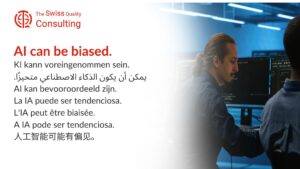Implementing Robust Auditing and Evaluation Frameworks
Developing Ethical Compliance Standards in Saudi Arabia and the UAE
The importance of ethical compliance in cognitive computing cannot be overstated, especially as these systems become more integrated into business operations in Saudi Arabia and the UAE. Ensuring that cognitive computing systems adhere to ethical standards requires the development and implementation of robust compliance frameworks. One key strategy is the establishment of clear ethical guidelines that govern the development and deployment of AI technologies. These guidelines should address issues such as data privacy, bias mitigation, and transparency, providing a comprehensive framework for ethical AI practices.
In Saudi Arabia, the government and private sector can collaborate to develop national standards for ethical AI. By creating a regulatory body tasked with overseeing AI development, the country can ensure that cognitive computing systems are designed and operated in accordance with ethical principles. This body could be responsible for certifying AI technologies, conducting regular audits, and enforcing compliance with ethical guidelines. Such an approach would not only enhance trust in AI systems but also promote innovation by providing a clear regulatory framework for businesses to follow.
Dubai, known for its technological advancements, can leverage its position as a global tech hub to lead in ethical AI practices. The Dubai Future Foundation and other innovation-driven organizations can spearhead initiatives to develop ethical compliance standards. By fostering partnerships between government entities, tech companies, and academic institutions, Dubai can create a collaborative ecosystem that prioritizes ethical considerations in AI development. These efforts can be supported by educational programs and workshops that raise awareness about ethical AI practices among developers and business leaders.
Implementing Regular Audits and Evaluations
To ensure ongoing ethical compliance, it is crucial to implement regular audits and evaluations of cognitive computing systems. These audits should be conducted by independent third parties to provide an unbiased assessment of the systems’ ethical performance. Regular evaluations help identify potential ethical issues early on and allow organizations to take corrective actions before problems escalate. This proactive approach to ethical compliance not only protects businesses from reputational damage but also ensures the responsible use of AI technologies.
In Riyadh, businesses can adopt a continuous monitoring approach to AI auditing. By integrating AI auditing tools into their systems, companies can track ethical performance in real-time and generate reports on key metrics. These tools can analyze data usage, detect biases, and assess compliance with ethical guidelines. Regular reports can then be reviewed by an internal ethics committee or an external auditor, ensuring that cognitive computing systems remain aligned with ethical standards.
Moreover, the use of Blockchain technology can enhance the transparency and accountability of AI audits. Blockchain’s immutable ledger can record all audit activities and findings, providing a tamper-proof record of compliance efforts. This ensures that audit results are trustworthy and verifiable, fostering greater confidence in the ethical integrity of cognitive computing systems. In Dubai, businesses can leverage Blockchain to create a transparent audit trail, enhancing their reputation as leaders in ethical AI practices.
Fostering a Culture of Ethical Awareness and Responsibility
Beyond technical measures, fostering a culture of ethical awareness and responsibility is crucial for ensuring long-term compliance with ethical standards in cognitive computing. This involves educating employees, from developers to executives, about the ethical implications of AI technologies and the importance of maintaining high ethical standards. By embedding ethical considerations into the corporate culture, organizations can ensure that ethical compliance becomes a fundamental aspect of AI development and deployment.
Executive coaching services play a vital role in fostering this culture. In Saudi Arabia and the UAE, executive coaching programs can include modules on ethical AI, providing leaders with the knowledge and tools needed to promote ethical practices within their organizations. These programs can cover topics such as ethical decision-making, risk management, and the social impact of AI technologies. By equipping leaders with the necessary skills, executive coaching services can drive ethical compliance from the top down, ensuring that ethical principles are integrated into all levels of the organization.
Furthermore, businesses can establish ethics committees or advisory boards that include experts in AI ethics, legal professionals, and representatives from civil society. These committees can provide guidance on ethical issues, review AI projects, and ensure that ethical considerations are integrated into business strategies. In Riyadh and Dubai, such committees can serve as a valuable resource for businesses, helping them navigate the complex ethical landscape of cognitive computing and ensuring that their AI systems are designed and operated responsibly.
In conclusion, ensuring ethical compliance in cognitive computing systems requires a multifaceted approach that includes the development of ethical standards, regular audits and evaluations, and the fostering of a culture of ethical awareness and responsibility. By implementing these strategies, businesses in Saudi Arabia and the UAE can ensure that their AI technologies are used responsibly and ethically, driving innovation while safeguarding societal values. As these regions continue to lead in technological advancements, prioritizing ethical compliance will be crucial for maintaining public trust and achieving sustainable business success.
—
#EthicalCompliance, #CognitiveComputing, #AI, #Auditing, #Evaluation, #BusinessStrategy, #SaudiArabia, #UAE, #Riyadh, #Dubai, #ArtificialIntelligence, #Blockchain, #TheMetaverse, #ExecutiveCoaching, #GenerativeAI, #ModernTechnology, #BusinessSuccess, #LeadershipSkills, #ManagementSkills, #ProjectManagement













